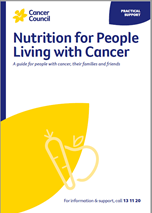- Home
- About Cancer
- Living well
- Nutrition and cancer
- The importance of eating well
- How to eat well after a cancer diagnosis
How to eat well after a cancer diagnosis
During cancer treatment and recovery, you may need to adapt what you eat to help meet your body’s changing needs.
Learn more about:
- Preparing for treatment
- During treatment
- After treatment
- Recovery
- Living with advanced cancer
- Video: How to eat well after a cancer diagnosis
 Preparing for treatment
Preparing for treatment
- Try to eat as well as you can before starting treatment.
- Eat a wide variety of foods from the 5 food groups and do some physical activity to build muscle (if you are feeling well enough).
- If you have lost weight or you are not eating as well as usual, you may need food with more energy (kilojoules, also known as calories) and protein.
- Ask your general practitioner (GP) or oncologist for a referral to a dietitian for advice about what to eat. You can also be referred to other health professionals, such as physiotherapists, exercise physiologists and psychologists. These health professionals can help prepare you for cancer treatment.
- Plan for days you don’t feel like cooking. Fill your freezer with frozen meals.
- Organise a meal roster with family and friends.
 During treatment
During treatment
- You may need food with more energy (kilojoules) and protein. If you don’t have much of an appetite, try eating small, frequent meals or snacks, rather than 3 large meals a day.
- If treatment affects what you can eat, see these tips.
- If you are losing weight, we discuss how to avoid further weight loss. Ask for a referral to a dietitian if weight loss is ongoing or fast.
- Do regular physical activity to improve appetite and mood, reduce fatigue, help digestion and prevent constipation. Exercise professionals such as a physiotherapist or exercise physiologist can help you develop an exercise plan.
- Check with your doctor or dietitian before taking vitamin or mineral supplements or making major changes to your diet.
- Look out for signs of malnutrition.
 After treatment
After treatment
- Try to maintain your weight to help you recover faster.
- Eat a wide variety of foods and do some physical activity to rebuild muscle and help you recover from the side effects of cancer treatment. For help developing an exercise plan, see a physiotherapist or exercise physiologist.
- If you continue to have treatment side effects that affect what you can eat, see these suggestions. See a dietitian for support and help.
 Recovery
Recovery
- Focus on healthy eating once you’ve recovered from the side effects of treatment. For more on this, see general healthy eating guidelines.
- Maintain a healthy weight and be physically active to help lower the chance of cancer coming back. Read more about physical activity guidelines for adults.
- Limit how much alcohol you drink. If you choose to drink, have no more than 10 standard drinks a week and no more than 4 standard drinks in one day.
- Visit your doctor for regular check-ups and see a dietitian for support.
- For more on this, see Living well after cancer.
 Living with advanced cancer
Living with advanced cancer
- Good nutrition can improve quality of life.
- Adjust what you eat to meet your changing nutritional needs.
- Talk to your doctor about medicines that may improve your appetite.
- Relax usual dietary restrictions, e.g. use full-cream rather than low-fat milk.
- Consider nutritional supplements if you can’t eat enough. Discuss options with your doctor, palliative care specialist or dietitian.
- For more on this, see Nutrition and advanced cancer.
→ READ MORE: Common questions about nutrition and cancer
Video: Eating well after a cancer diagnosis
Podcast: Meditation and Relaxation
Listen to more of our meditation and relaxation podcast for people affected by cancer
More resources
Jacqueline Baker, Senior Oncology Dietitian, Chris O’Brien Lifehouse, NSW; Lauren Atkins, Advanced Accredited Practising Dietitian, OnCore Nutrition, VIC; Dr Tsien Fua, Head and Neck Radiation Oncology Specialist, Peter MacCallum Cancer Centre, VIC; Rosemerry Hodgkin, 13 11 20 Consultant, Cancer Council WA; Clare Hughes, Manager, Nutrition Unit, Cancer Council NSW; John Spurr, Consumer; Emma Vale, Senior Dietitian, GenesisCare, SA; David Wood, Consumer.
View the Cancer Council NSW editorial policy.
View all publications or call 13 11 20 for free printed copies.

